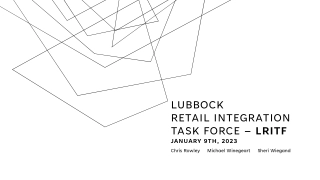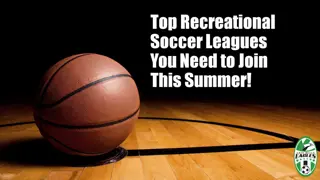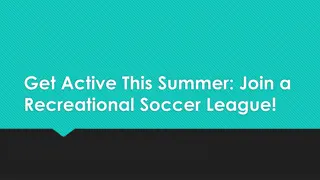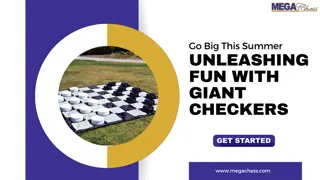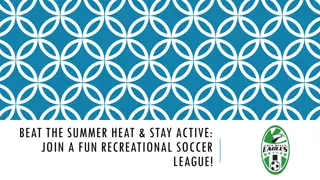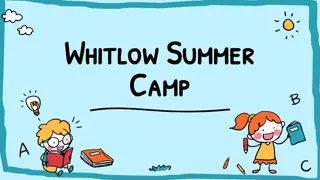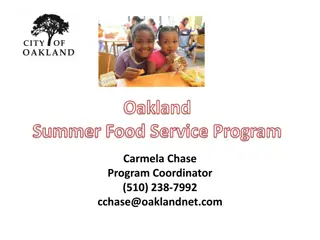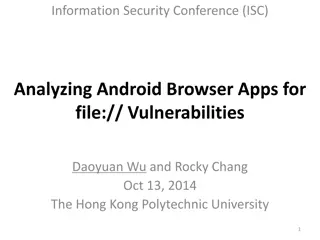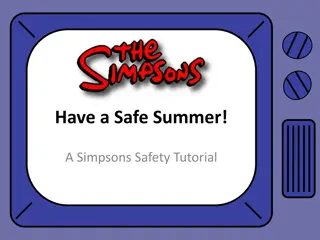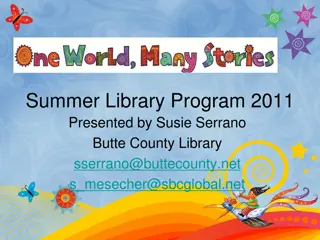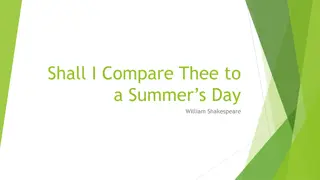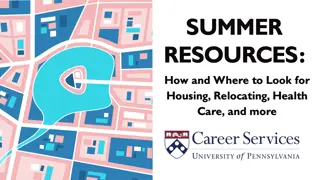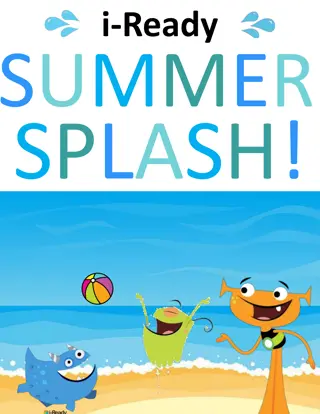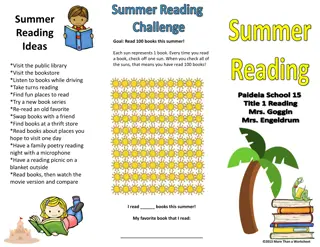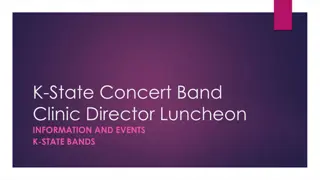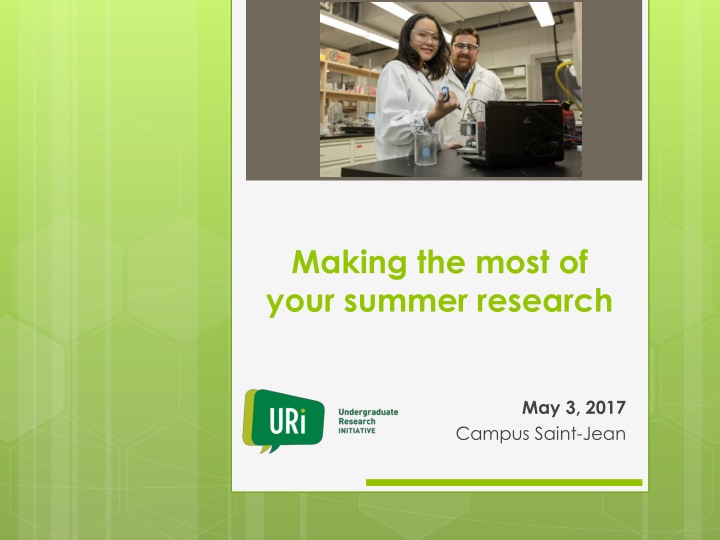
Maximizing Summer Research Goals and Skill Development
Explore how to make the most out of your summer research experience by setting specific, measurable, and realistic goals for both research and skill development. Learn key strategies for effective communication with supervisors, asking for advice, and utilizing resources to support your research journey.
Download Presentation

Please find below an Image/Link to download the presentation.
The content on the website is provided AS IS for your information and personal use only. It may not be sold, licensed, or shared on other websites without obtaining consent from the author. If you encounter any issues during the download, it is possible that the publisher has removed the file from their server.
You are allowed to download the files provided on this website for personal or commercial use, subject to the condition that they are used lawfully. All files are the property of their respective owners.
The content on the website is provided AS IS for your information and personal use only. It may not be sold, licensed, or shared on other websites without obtaining consent from the author.
E N D
Presentation Transcript
Making the most of your summer research May 3, 2017 Campus Saint-Jean
What makes you nervous about starting your research?
During this session you will: Articulate some research & skill development goals for the summer Develop your own list of questions to discuss with your supervisor Practise asking for advice effectively Learn some research tips Learn about resources to support your research
Everyone starts somewhere You get out of your experience what you put into it: Your attitude Your willingness to learn Your work ethic You will make mistakes. You will fail sometimes. You will also learn.
What are your goals? What are your researchgoals? What are your skill development goals? Are your goals: Specific Measurable Agreed upon (with your supervisor) Realistic Time-based
Setting your research goals Do you have a clearly defined research question? What is your role in this project? What is your approach? Methodology Timelines What do you need to start? Materials/supplies Knowledge (e.g. background reading) Skills/techniques/training What are your expected outcomes? By the end of the summer, I will complete X Review with supervisor!
What are 2-3 research goals for this summer?
Skill development goals What do you already know? Skills inventory What do you want to know/learn/do/improve? Skills inventory Careers in Academia worksheet What opportunities do you have to develop these skills? Through my project Training/courses Mentorship How will you know you have achieved your goals? Completion of research milestones Feedback from supervisor
What are 2-3 skill development goals for this summer?
Clarifying basic expectations Review your research & skill development goals does your supervisor have similar expectations? Hours of work don t assume normal business hours Who do you report to? how, how often? Who should you go to for guidance? for what types of issues/decisions? What training or orientation is required? *Safety, research ethics, etc. What self-directed learning is expected? What other ground rules do you need to know?
Getting along with your supervisor Like any relationship - communication is key! Clarify expectations early & often. (Always ask!) Develop a plan for your project -- include measurable milestones & timelines How will you know you are making progress? How will your supervisor evaluate your work? If something isn t working, or you make a mistake speak up!
Getting along with your research group Take time to get to know the people in your group. Learn from them! Learn the group culture. Respect the workspace. Help each other out be willing to step up and take the initiative & show gratitude for those who help you. Remember: Behaviour is what we see; motivation isn t always obvious - - try to understand the whole picture before reacting to someone s behaviour
What questions do you have for your supervisor or research group?
How to ask for advice...effectively. Provide context: What were you doing? Why? What did/didn t work? What do you think is happening? Why? What are some options you ve considered? Remember: Your supervisor may be the expert, but YOU are closest to your own work.
Think of a time when someone asked you for advice. What would have helped you understand the situation and effectively offer advice?
Research record-keeping Record-keeping is CRUCIAL not just for you, but for everyone who comes after you. Update your research notes daily: don t fall behind! (schedule it into your day) Have someone check over your notes Get in the habit of labeling materials, data & files consistently. Keep an inventory of materials related to your project & their storage locations.
Tech tipsfrom other students Lab math: Do the math once, save it for later! Write storage temperatures/locations on bottles until you remember them. Make sure you understand why you are using a protocol and how it works. Plan ahead: time, supplies, calculations, equipment use, etc. Read a little bit every day.
Writing & Presenting your results: What to think about NOW Don t wait to start reading learn the literature early! Keep track of what you re reading; take notes & consider using a reference manager (e.g. RefWorks, Zotero) Write up your work as you go and get feedback on your writing. Consider how you will analyze your data e.g. what stats will you use, what control groups, etc. (Good experimental design NOW will save you time later.)
What are some strategies I will use to effectively manage my time this summer?
Presentation & Publication opportunities Festival of Undergraduate Research & Creative Activities (FURCA) Undergraduate Journals Faculty/Department research days (check with your supervisor for submission deadlines) Peer-reviewed publications with your supervisor
Help! What do I do if? I make a mistake? I don t get along with someone in my group (or my supervisor)? I realize my project/research isn t for me? My supervisor wants me to present, but my project isn t finished? Other concerns ?
Next steps when your project is over Make sure all of your data & materials are labeled & stored appropriately, and are accessible to those who continue your project. Write up any reports required by your supervisor and/or your funding agency. Prepare abstracts/presentations, if necessary. Reflect on what you ve learned and your own next steps.
Campus Resources URI Seminars/workshops (funding, publication/presentation, next steps, etc.) Funding URI Support Fund, URI Stipend Poster Tip Sheet: http://bit.ly/2oQKqw8 FURCA (March 2018) e-newsletter
Campus Resources U of A Library Liaison Librarians Undergraduate Research LibGuide RefWorks Research Data Management Week Education & Research Archive Open Journal System (Undergraduate Journals) Tutorials: http://www.library.ualberta.ca/tutorials/
Environmental Health & Safety Online training in lab, chemical, radiation & biosafety. Even if you don t need it now...plan to take advantage of the free training while you re a student. It will pay off later! https://www.ualberta.ca/ environment-health- safety/training
Research Ethics Office Online training Part 1 Animal Ethics Human Ethics REMO (online system) In-person training Animal handling http://www.reo.ualb erta.ca/Education- Training-User- Support.aspx
Other Campus Resources Field Research Office (field safety, training, permits) Student Success Centre -- (workshops/consultations) Centre for Writers (writing help any discipline!) SUBPrint (large format printing)
Other Resources Undergrad in the Lab: http://www.undergradinthelab.com/ Council for Undergraduate Research: http://www.cur.org/ WebGURU: Undergraduate Research: http://www.webguru.neu.edu/undergraduate- research Zotero: reference management app: https://www.zotero.org/
And dont forget to have fun... I had no technical knowledge when I was taken on. But it was soon apparent that a general overview of physics is often more valuable than expertise and routine. What one acquires through the sheer joy of finding out is a useful, versatile instrument in the hands of a living being ~Albert Einstein in an open letter to an unsure physics student
For more information Crystal Snyder Undergraduate Research Coordinator, URI cs2@ualberta.ca 780-492-4183 2-701 SUB www.uri.ualberta.ca

